Georgia Cancer Center nurturing tomorrow's biomedical scientists
"The Summer Research Experience program has become a beacon of inspiration for young minds enthusiastic about biomedical sciences."

Through a grant awarded to the Augusta University’s Well-Being Committee, the University System of Georgia’s Board of Regents is investing in the health of AU employees and students. The grant includes skin cancer prevention education and the installation of four sunscreen dispensers on campus by members of the Well-being Committee. Two are located on the Health Sciences campus, one on Summerville campus, and one at the Forest Hills campus inside Christenberry Fieldhouse. The hands-free, battery-operated sunscreen dispensers make sunscreen applications easy.
Skin cancer risk reduction and prevention educational sessions are offered by the Georgia Cancer Center’s Cancer Information & Awareness Program. AU departments as well as other organizations can contact Maryclaire Regan to arrange for educational sessions.
Augusta University employees receiving University System of Georgia health insurance benefits can receive 250 Well-being credits for participating in a Sun Smart, Skin Safe educational session. AU departments can request an educational session for their staff and for students.
Periodic Sun Smart, Skin Safe sessions designed for AU employees will be offered throughout the year. Check this website for session dates and locations and sign-up by emailing Maryclaire Regan.
Skin Cancer
Skin cancer is the most common cancer in the U.S., with 1-in-5 people diagnosed in their lifetime. New cases of skin cancer are increasing. Of the three leading skin cancers – basal cell carcinoma, squamous cell carcinoma, and melanoma, “UV radiation is a proven cause of basal cell carcinoma (BCC) and squamous cell carcinoma (SCC)” and it plays a strong role in the development of melanoma, the most dangerous of these cancers. UV exposure is a modifiable skin cancer risk factor although genetic factors, such as skin type, play a role.
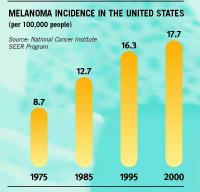 New cases of melanoma have doubled in the U.S. from 8.7 cases per 100,000 people in
1975 to 17.7 in 2000 (See Graph). From 2014-2018, Georgia’s rate of new cases of melanoma of the skin was 26.8 per
100,000, exceeding the U.S. rate of 22.6. From 2015-2019, the melanoma mortality rate
was 2.0 per 100,000 for the state, slightly lower than the U.S. rate of 2.2. Still,
in Georgia, melanoma of the skin is the fifth leading cause of new cancers and 3,800
Georgians were expected to develop it in 2021.
New cases of melanoma have doubled in the U.S. from 8.7 cases per 100,000 people in
1975 to 17.7 in 2000 (See Graph). From 2014-2018, Georgia’s rate of new cases of melanoma of the skin was 26.8 per
100,000, exceeding the U.S. rate of 22.6. From 2015-2019, the melanoma mortality rate
was 2.0 per 100,000 for the state, slightly lower than the U.S. rate of 2.2. Still,
in Georgia, melanoma of the skin is the fifth leading cause of new cancers and 3,800
Georgians were expected to develop it in 2021.
Sun Smart, Skin Safe
Health Sciences Campus
GCC - M. Bert Storey Research Building
Maryclaire Regan
706-721-4539
‘Sun Belt’ is a moniker that characterizes weather in the southeast U.S. On average,
Augusta, GA logs 218 sunny days each year (61%). The Ultraviolet (UV) Index measures
UV radiation reaching the earth’s surface with exposure ranging from 1 to 11+.
The higher the UV Index the greater the dose of skin and eye damaging UV radiation. Augusta’s UV Index hovers in the ‘Very High’ and ‘Extreme” ranges from May to September. The Environmental Protection Agency (EPA) states the “UV Index is a useful tool to help the general public take steps to reduce their exposure to solar UV radiation, but its effectiveness depends on how well the information is communicated.” As a handy tool, many weather apps in cell phones list the UV Index which can be checked daily to help guide protection.
Protect Your Skin
Ultraviolet A (UVA) and ultraviolet B (UVB) radiation damage DNA in skin cells and produce genetic defects (mutations) in the skin or eyes that can lead to cancer. UV rays account for 90% of skin cancers and cause eye damage such as corneal sunburn, cataracts (that can lead to blindness), and eyelid cancers, particularly of the lower eyelid. Basal cell carcinoma makes up 90% of eyelid skin cancers and squamous cell carcinoma comprise 5%. Eyelid basal cell and squamous cell carcinomas can spread to the eye and, if untreated, can cause blindness.
The Mayo Clinic suggests that sunglasses are a “must wear” and a good investment to help protect the thinnest skin around the eyes from cancer. In addition to broad-spectrum sunscreen of SPF 15 or higher, the Skin Cancer Foundation recommends that sunglasses be worn year-round whenever exposed to the sun. Sunglasses should block 99%-100% UVA and UVB light. Hats with at least a three-inch brim to protect the top of the head, ears, and face can block about one-half of all UV rays from the eyes and eyelids. The Foundation also advocates for sun-protective umbrellas.
Learn more about your possible risks for skin cancer and ways to reduce your risk using educational materials and resources.
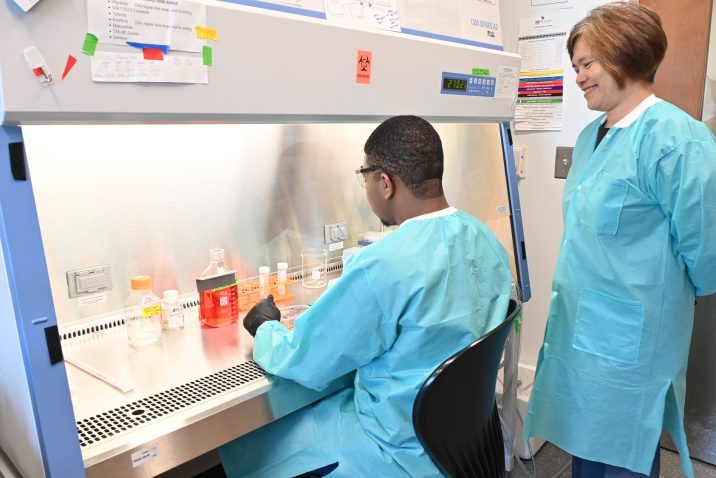
"The Summer Research Experience program has become a beacon of inspiration for young minds enthusiastic about biomedical sciences."
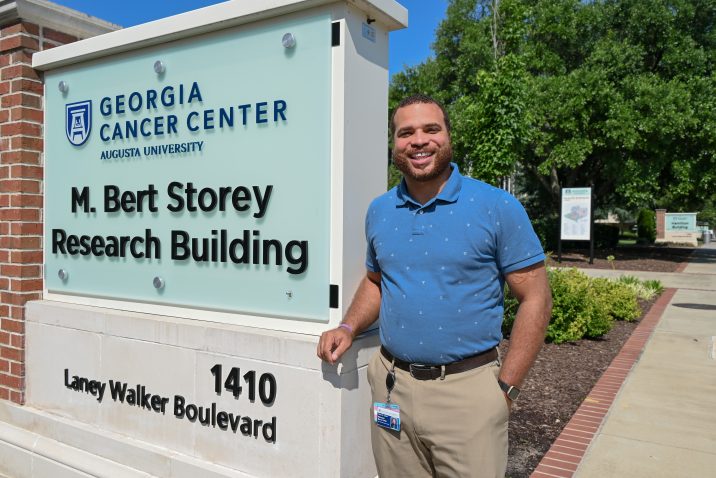
It is a key to life, but not every person living in Augusta has the same access to healthy food as their neighbors across the region.
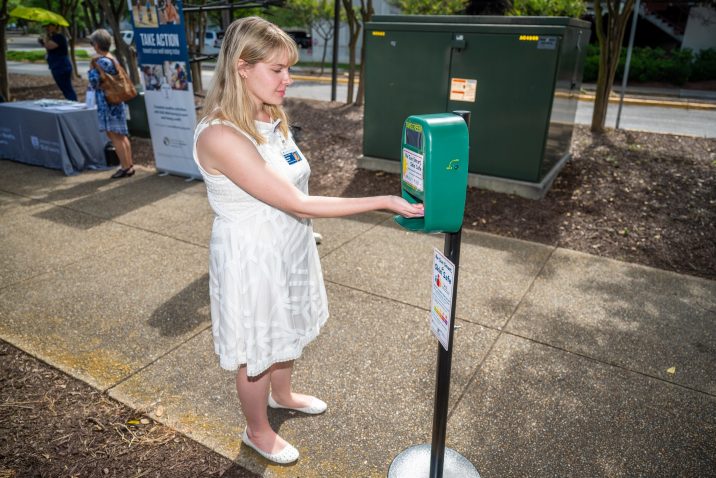
Skin cancer is the most common cancer in the United States, with 1 in 5 people diagnosed in their lifetime. With new cases of skin cancer climbing, members of Augusta University's Well-Being program, along with the Georgia Cancer Center, are taking action to protect students, employees and the public from a future skin cancer diagnosis by installing sunscreen dispensers across all Augusta University campuses in Augusta's River Region.
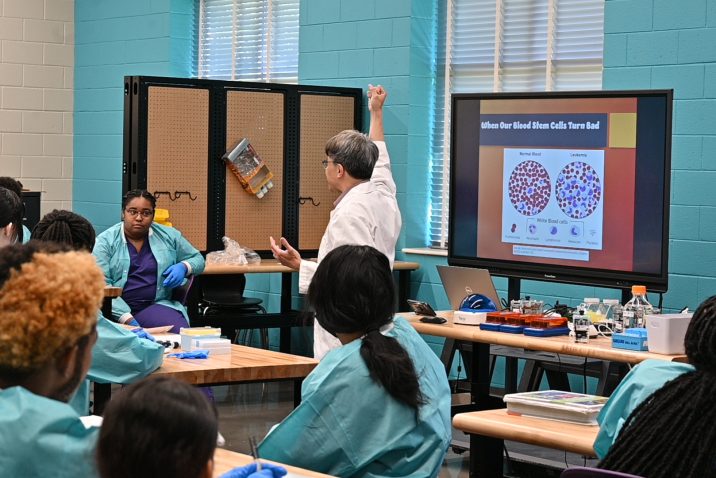
A mobile lab is rolling through high schools with the goal to educate and inspire the next generation of cancer researchers.